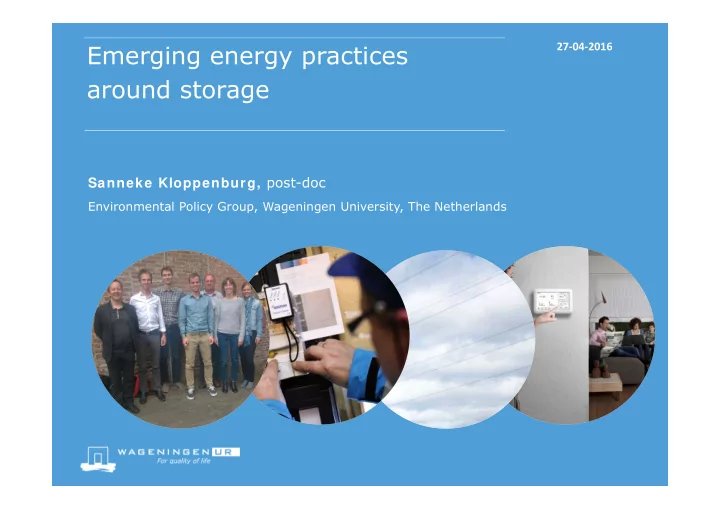

Emerging energy practices 27 ‐ 04 ‐ 2016 around storage Sanneke Kloppenburg, post-doc Environmental Policy Group, Wageningen University, The Netherlands
outline Main project ‘emerging energy practices in the smart grid’ Research proposal on small-scale storage Some (very) preliminary findings Next steps 2
Main project ‘Emerging energy practices in the smart grid (2014-2018) Aim: To analyse and assess the development of new energy practices as they emerge in smart grids, as to reduce uncertainty about consumer appreciation and uptake of smart grids configurations. Main research questions: 1. How do householders become enrolled in and empowered by sustainable, smart grid-enabled energy practices? 2. To what degree do householders employ these “emerging energy practices” and (how) do they lead to more flexible and renewable energy consumption patterns? 3
Framework Moral Innovations Economy HEMS Cooperatives Storage Energy practices Generating, managing and consuming -> findings serve as input to stakeholderplatforms -> recommendations and strategies for smart grid policies and programmes 4
Emerging energy practices around storage Subproject within the Emerging Energy Practices project Analysis of different sociotechnical configurations of small-scale storage in The Netherlands, UK, and Germany 5
Domestic storage 6
Research aim and questions Understand the different roles of end-users in the design and use of small-scale electricity storage and the (potential) consequences for power relations in smart energy systems How do different modes of storage in different configurations of smart grids (potentially) transform energy practices and power relations in energy systems? 7
Modes of storage Mode as a mix of technology and social organisation (Walker and Cass 2007) Storage modes: afford (new) energy practices such as charging/discharging, and the exchanging, trading, monitoring and consuming of (stored) energy allocate roles and responsibilities distribute costs and benefits 8
Idealtypical modes Grid operator storage (Netherlands) Community storage (UK?) Householder storage (Germany) Netherlands: research in pilot projects of DNOs: Jouw Energie Moment phase 2, City-zen (?) (2016-2018) Germany: research on Sonnenbatterie and individual households (2016) 9
Research subquestions How are end-users represented in existing storage projects and/ or concepts What energy practices does the project and/ or battery system afford? How are task and responsibilities distributed? How are costs and benefits defined and distributed? Which rationalities are connected to the storage projects and/ or concepts? 10
UK Approach Interviewing stakeholders: battery system developers, community energy groups, grid operators, etc Visiting pilot projects Sequenced visit: Sanneke, Nick (27 April-18 May), Robin (16 May-4 June) Geographical clusters: Southwest, Scotland, London 11
First steps in the field… 4 interviews in the South-West (Bristol/Oxford) ● Project leader SoLa Bristol ● Project leader ERIC ● Storage consultant ● Two Eco-home volunteers 12
13
Preliminary findings 14
SoLa Bristol (2012-2016) Led by Western Power Distribution (DNO) 26 households (city council housing, pre-payment meter) Aims: ● solve the network problems that arise when a number of customers in a local area connect PV solar panels to their house ● investigate how a battery installed in a property can help customers to manage their energy usage and save money on their bills ● test how customers respond when offered different electricity tariffs throughout the day ● explore the benefits of utilising direct current (DC) in the home (WPD 2016) 15
Emerging energy practices grid services self-consumption of PV (and stored energy?) charging/discharging: remote control by DNO monitoring (co-design of user-interface) 16
SoLa Bristol user interface 17
Initial findings Benefits for householders: financial reward for ‘demand reduction’ brought by PV and demand shift brought by battery storage ‘keeping the lights on’ (+charging DC appliances) (problem during winter) saving on bills grid operator experimenting with battery strategies hh no insight in dynamic tariffs and battery strategies Household(er) as a load (type), solar consumer (and battery watcher) 18
Project ERIC (2015-2018) Led by battery system developer Moixa and Bioregional 82 households (mix of council+social housing and homeowners) Aims: -increasing self-consumption of pv within the community -reducing peaks in electricity export and demand -giving households control over their use 19
Emerging energy practices self consumption of PV self consumption of stored energy during peak times grid services charging/discharging (based on learning algorithms about household demand) monitoring ‘sharing’ 20
Initial findings Virtual energy community: ‘sharing’, neighbourhood electric vehicle Different algorithms: carbon saving, cost-saving, self- consumption, grid services. Householders as a virtual energy community, DC consumers with individual profiles 21
(very) preliminary general findings Batteries are hard to find and tend to be removed… New roles and responsibilities are emerging Householders’ control is limited Embedded values and choices in the design of systems Algorithms 22
Fieldwork Plans UK Storage and energy communities May 4-5 All Energy exhibition and conference in Glasgow Connect to relevant projects/organisations, hopefully visit Community Energy Scotland Learn more about CLNR – visit Newcastle Uni (Bulkeley/Powells) 23
Recommend
More recommend